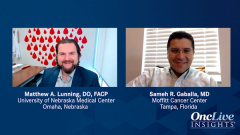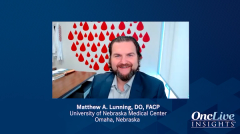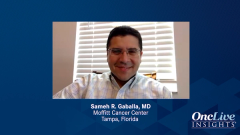
Patient Scenario 2: A 53-Year-Old Man With Relapsed/Refractory FL
Centering discussion on a second patient scenario of follicular lymphoma, key opinion leaders consider best therapy for patients with early or aggressive relapse.
Episodes in this series

Transcript:
Sameh R. Gaballa, MD: Let me run a patient scenario by you. So, a POD24 [progression of disease within 24 months], for example. Again, POD24 [refers to] patients with follicular lymphoma who have disease relapse within 2 years of chemoimmunotherapy. For example, a patient walks in, they’re 53 years old. They were previously treated with rituximab bendamustine for bulky retinopathy above and below the diaphragm. Most of the SUBs were below 10. Patient had an excisional biopsy. At that time, there was no evidence of large cell transformation. They received 6 cycles of bendamustine rituximab. However, 18 months later, they noticed the cervical retinopathy with anemia and thrombocytopenia. Workup reveals that, again, they have bulky relapse with adenopathy above and below the diaphragm, now with bone marrow involvement as well. One of the concerns in these patients is to rule out transformation. For those who have disease transformation, that’s a different story because we would treat them similarly to how we would treat diffused large B-cell lymphoma. But, if indeed this is follicular lymphoma POD24, how do you treat those patients and do you treat them any differently? And maybe we could comment about the role of transplant as well.
Matthew A. Lunning, DO, FACP: So this is a real case. It just happens in the minority of patients. I think POD24 was listed at 20% of potential follicular lymphoma population. I honestly believe that is probably really 2% of all follicular lymphoma patients. It’s just a log lower from that standpoint. That is what it is. You know, the case that you alluded to is a real deal. You can’t predict them when you started the BR [bendamustine and rituximab] of who’s going to be in this situation and who can’t. I think that’s been the crux of a lot of the matter of how to study this population. Coming back to how I would treat this patient, really is, do they need treatment? This patient does. But there are some patients who relapse who may not, who may go a year or 2 more without needing therapy for low-burden asymptomatic disease. This patient has cytopenias, they have bulky retinopathy, like you said, probably meeting GELF [Groupe d’Etude des Lymphomes Folliculaires] criteria. In this situation, again, I was alluding to the trial, which is looking specifically at this population, but even off of that trial, I think obinutuzumab [and] lenalidomide would be a reasonable option. R-squared would be a reasonable option. We really don’t know what obinutuzumab CHOP [cyclophosphamide, doxorubicin, vincristine, and prednisone] or what CHOP after BR does in relapsed/refractory follicular lymphoma. But to your question about transplant, really this is where you have that discussion.
There has been CIBMTR [Center for International Blood and Marrow Transplant Research] data looking at transplant within the first year in the POD24 population [who] may derive benefit, but I think it is that time where it’s a go or no-go discussion. I know that transplant has fallen out of vogue because of CAR T cells and bispecifics coming. I still think off of a clinical trial, I’m using R-squared on a clinical trial. I’m looking for a combination that has a lenalidomide backbone in this population. Is O-chemo [obinutuzumab plus chemotherapy] a wrong answer here? I don’t think it is, but I think you’re still asking that question after 2 to 4 cycles. Should I consolidate with an auto transplant in this scenario? Because this is a young person where, in my opinion, you’re trying to get more time with their second-line therapy than you did with their first. So that’s what the conversation I’m having is—you’re battling against that disease biology, which is the law of dimension returns, right? First line is longer, second line shorter, third line shorter. You’re trying to be impactful at the second line [where] you’re getting a longer period of time than you did with the first-line treatment. What that strategy is can differ. It’s a very long discussion, and these consultations are not in 20 minutes.
Sameh R. Gaballa, MD: No, definitely not. My personal position on transplant is, so for follicular lymphoma, it’s not a curative treatment. I mean, allogeneic transplants, you certainly see a plateau in the curve and the relapse is lower. There’s certainly some cure. But with autologous transplant it’s not going to be a curative intent treatment.
So, I personally would go for CAR T prior to an auto transplant. But transplant is certainly an option, particularly in patients with POD24. Patients who are younger, and who have high risk disease, sometimes I can even consider allogeneic transplants. But these are patients typically [whose diseases] failed CAR T, have failed bispecifics; these are higher-risk patients. In terms of the CAR T data, we have 2 approvals. We have axi-cel [axicabtagene ciloleucel], we have tisa-cel [tisagenlecleucel]; as you had mentioned, there is the [phase 3] ZUMA 22 study [NCT05371093], which we have at our center, which will randomize patients with relapsed follicular lymphoma as early as second line for POD24, to standard of care chemoimmunotherapy or R-squared versus CAR T-cell therapy, in this patient population. But I agree with you, it’s going to take a number of years before we get a readout, particularly [for] these patients with POD24, [who] only represent about 20% of patients with follicular lymphoma. I think the other interesting approach in these patients is bispecific antibodies. We’ve all seen the data with mosunetuzumab, which again, is now approved. We have response rates close to 80% with about a CR of 60%. But again, we need longer follow-up on the data. Same thing with the iCAR [inhibitory CAR] R-squared, which looks, again, very interesting and results were just updated at this ASCO [American Society of Clinical Oncology meeting].
Transcript edited for clarity.







































